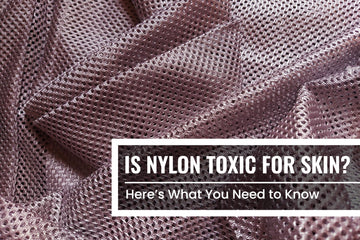Is Nylon Toxic for Skin? Here’s What You Need to Know
──── fashion
Hey, friends! So, have you ever wondered whether nylon is safe for your skin? Maybe you’ve noticed that certain clothes or accessories made of nylon make your skin feel irritated or itchy, and now you're thinking, “Is nylon toxic for skin?” I totally get it. With all the different materials in our clothes, it's hard to know what’s actually good for us and what’s not.
Well, if you’ve ever found yourself in this situation (or are just curious), don’t worry—I’m here to help! In this blog post, we’ll dive into the truth about nylon and its potential impact on your skin. We’ll explore what nylon is, whether it’s toxic, and how it can affect different skin types. Plus, I’ll share some tips for avoiding any irritation or discomfort if you love your nylon gear.
So, let’s jump right in and figure out if nylon is a friend or foe when it comes to your skin!

(Image credit: www.blackwhite.pictures)
What is Nylon, Anyway?
Before we get into whether nylon is toxic for skin, let’s take a minute to understand what nylon actually is.
Nylon is a synthetic fabric made from a type of plastic. It was first introduced in the 1930s and quickly became popular because of its durability, elasticity, and resistance to wear and tear. You can find nylon in all sorts of everyday items, from clothing and shoes to bags, umbrellas, and even carpets. In fact, it’s one of the most common synthetic fibers used in the fashion industry.
It’s made by combining chemicals that are then heated and processed into long threads or filaments, which are woven into fabric. This fabric is strong, lightweight, and holds up well to washing and general wear. But here’s the thing—because nylon is a synthetic material, it doesn't always behave the same way as natural fabrics like cotton or wool, especially when it comes to your skin.
Is Nylon Toxic for Skin?
Okay, let’s get to the big question: is nylon toxic for skin? Well, the short answer is: not exactly. But there’s more to it than that.
Here’s the deal—nylon itself isn’t inherently toxic. The material itself doesn’t contain harmful chemicals that directly cause poisoning or long-term damage to your skin. However, there are a few things to consider that might make nylon a little less than ideal for some people:
1. Allergic Reactions and Sensitivity
While nylon isn't toxic for most people, it can cause skin irritation or allergic reactions in some individuals. This is particularly true for people who have sensitive skin or are prone to conditions like eczema or dermatitis. The synthetic nature of nylon means it doesn’t breathe as well as natural fibers, which can trap heat and moisture against the skin. This can lead to discomfort, itching, and even rashes in some cases.
I remember a friend of mine who loved wearing nylon leggings, but after a few hours, she’d notice that her legs started itching and breaking out. Turns out, the leggings were trapping sweat and causing her skin to react. She switched to leggings made from more breathable materials like cotton or bamboo, and the irritation went away.
So, if you have sensitive skin or tend to get rashes easily, you might want to avoid wearing nylon for extended periods, especially when it's in direct contact with your skin, like in leggings or tight clothing.

2. Heat Buildup and Sweating
Nylon doesn’t have the same breathability as natural fabrics like cotton, linen, or wool. Because it’s synthetic, it doesn’t absorb moisture as effectively, which means sweat and body heat can get trapped between the fabric and your skin. This creates a warm, moist environment where bacteria and fungi thrive, leading to potential irritation or even infections.
If you wear nylon in hot, sweaty conditions (like during exercise or on a hot day), you might notice that your skin starts to feel irritated or uncomfortable. This is because the fabric doesn’t allow your skin to breathe as freely as natural fibers do.
Pro Tip: If you’re prone to sweating or live in a hot climate, consider wearing clothing made from natural materials or moisture-wicking fabrics. These fabrics allow your skin to breathe and help manage sweat, preventing irritation.
3. Chemicals in the Manufacturing Process
Another factor to consider is the chemicals used in the production of nylon. While the fabric itself isn’t toxic, the process of making it involves the use of chemicals like hexamethylenediamine and adipic acid. These chemicals are used to synthesize nylon and may leave behind traces on the final product. For most people, these chemicals aren’t a concern. However, if you have particularly sensitive skin or allergies, there’s a slight chance that trace chemicals left on the fabric could cause irritation or an allergic reaction.
If you’re concerned about potential chemical exposure, washing your nylon items before wearing them can help reduce any leftover chemicals that might irritate your skin.

(Image credit: @umnCSE)
4. Environmental Concerns
While nylon itself may not be toxic to your skin, it’s worth noting that it’s not exactly eco-friendly. Nylon is a petroleum-based product, and the production of nylon involves the release of greenhouse gases and other pollutants into the environment. Plus, it’s not biodegradable, which means that if your nylon clothes or accessories end up in a landfill, they’ll stick around for a long time.
While this doesn’t directly affect your skin, it’s still something to keep in mind if you’re considering the environmental impact of your clothing choices.
How to Prevent Skin Irritation from Nylon
If you love nylon and don’t want to give up your favorite pieces but are worried about skin irritation, don’t panic! There are ways to minimize irritation and keep your skin comfortable while wearing nylon. Here are a few practical tips:
1. Opt for Blended Fabrics
One way to enjoy the benefits of nylon without the discomfort is to look for blended fabrics. Nylon blends, where nylon is mixed with natural fibers like cotton or wool, offer the best of both worlds. You get the durability and strength of nylon, with the breathability and softness of natural fibers. These blends are less likely to trap heat and moisture, which can reduce the chances of irritation.
2. Wear Nylon in Moderation
If you love nylon clothing but find it irritating after a few hours, try to wear it in moderation. For example, you can wear nylon during cooler weather or for activities where you’re not sweating as much. If you’re going to be active or exposed to heat, consider swapping out nylon for more breathable fabrics like cotton or bamboo.
3. Wash Nylon Before Wearing
As mentioned earlier, the chemicals used in the production of nylon can sometimes irritate the skin. A good way to minimize this risk is to wash your nylon clothes before wearing them. This can help remove any trace chemicals left behind during manufacturing and reduce the chance of irritation.

4. Choose High-Quality Nylon
Not all nylon is created equal. Higher-quality nylon fabrics are often treated with special coatings to make them more breathable or moisture-wicking, which can help prevent irritation. If you have sensitive skin, it’s worth investing in higher-quality nylon products that are designed to be more skin-friendly.
5. Pay Attention to Fit
Tight-fitting nylon clothing can increase the chances of irritation, especially if it rubs against your skin for extended periods. Opt for looser-fitting garments that don’t restrict airflow and give your skin room to breathe. For example, try loose nylon jackets or breathable nylon skirts instead of tight nylon leggings or body-hugging garments.
When Should You Avoid Nylon?
While nylon can be a great fabric for many applications, there are certain situations where you should consider avoiding it, especially if you have sensitive skin. Here are some examples:
- If you have eczema or dermatitis: People with sensitive skin conditions may find that nylon aggravates their skin. Natural fabrics like cotton or bamboo are often gentler on the skin and less likely to cause flare-ups.
- During intense physical activity or sweating: If you’re exercising or spending time in hot, humid conditions, it’s best to choose moisture-wicking fabrics that can keep your skin dry. Nylon doesn’t absorb sweat, which can lead to discomfort.
- If you have allergies to chemicals: If you have known sensitivities to chemicals used in the manufacturing process, it’s a good idea to wash nylon clothing before wearing it, or opt for products made from natural materials.

FAQs
1. Can nylon cause skin irritation?
Yes, nylon can cause skin irritation for some people, especially those with sensitive skin or conditions like eczema. The synthetic nature of nylon can trap heat and moisture against your skin, leading to itching, redness, or rashes. If you’re prone to skin sensitivities, you may want to opt for natural fibers or blended fabrics instead.
2. Is nylon safe for everyday wear?
For most people, nylon is safe for everyday wear. However, if you experience any discomfort, itching, or redness when wearing nylon, it’s a good idea to switch to more breathable fabrics. If you love nylon, try blending it with natural fabrics like cotton or wool to make it gentler on your skin.
3. Does washing nylon before wearing it help?
Yes! Washing nylon before wearing it can help remove any chemicals left over from the manufacturing process. This can reduce the chances of irritation or allergic reactions. Always wash your nylon items before wearing them for the first time to minimize potential skin issues.
4. Can nylon cause sweating or overheating?
Nylon isn’t as breathable as natural fabrics like cotton or linen, so it can trap heat and moisture, which might cause sweating or discomfort. This is especially true if you're wearing nylon in hot, humid conditions or during physical activity. If you find yourself overheating in nylon, consider switching to moisture-wicking fabrics designed to keep your skin dry.
5. Is nylon better than polyester for the skin?
Both nylon and polyester are synthetic fabrics, and while neither is as breathable as natural fibers, they have their pros and cons. Nylon tends to be softer and more durable than polyester, but it can still cause irritation for sensitive skin. If you're looking for a fabric that's more skin-friendly, try materials like cotton, bamboo, or blends of natural fibers.
6. How can I tell if my nylon clothing is causing irritation?
If you notice red patches, itching, rashes, or discomfort after wearing nylon, it’s likely causing irritation. In this case, it's best to remove the clothing immediately and switch to something made from natural fibers. You can also try washing the nylon item to remove any chemicals that may be causing the reaction.
7. Can nylon be harmful to my skin in the long run?
While nylon itself is not inherently harmful, prolonged exposure to poor-quality nylon or constant irritation can cause long-term discomfort, especially for people with sensitive skin or allergies. If you regularly experience irritation from nylon, it's a good idea to limit its use and opt for materials that are gentler on your skin.
8. Is nylon eco-friendly?
While nylon isn’t toxic for the skin, it's not particularly eco-friendly. It’s a petroleum-based product and is not biodegradable, meaning it can stick around in landfills for a long time. If you’re concerned about the environment, you might want to look for sustainable alternatives like organic cotton or recycled fabrics.
Final Thoughts
So, is nylon toxic for skin? Not exactly. While it’s not inherently toxic, it can cause irritation or discomfort for some people, especially those with sensitive skin or certain conditions. Nylon’s lack of breathability and the chemicals used in its production can sometimes lead to skin issues, but with the right precautions, you can still enjoy nylon clothing without any problems.
If you’re a fan of nylon, try blending it with natural fabrics, wear it in moderation, and always wash it before wearing to reduce the risk of irritation. And of course, listen to your body—if you start to feel uncomfortable, it’s always a good idea to switch to something else.
Have you ever had any issues with nylon? Or maybe you’ve found a fabric that works better for your skin? Drop a comment below—I’d love to hear your thoughts!
Stay comfortable, stylish, and kind to your skin!










